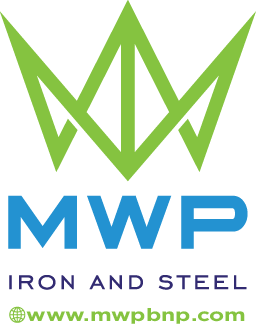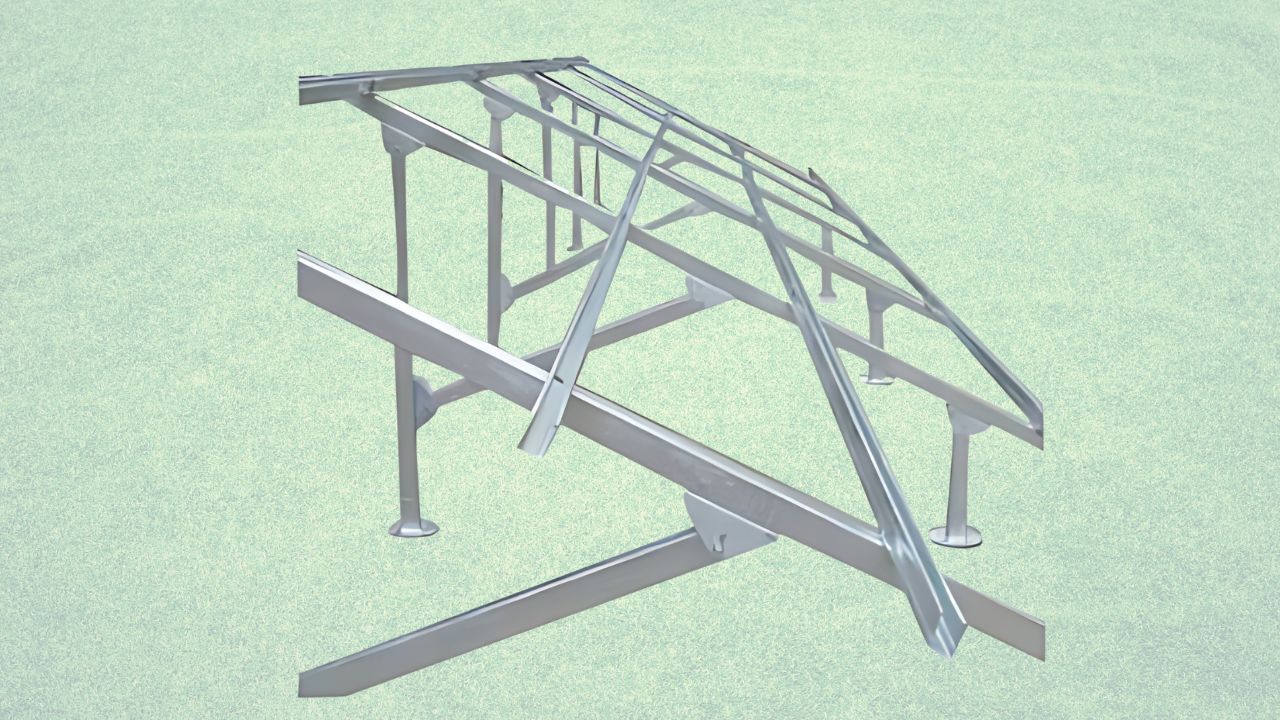Solar Panel Steel Frames:
Solar Panel Steel Frame are a cornerstone of renewable energy generation. They capture sunlight and convert it into electricity, offering a clean and sustainable alternative to traditional fossil fuels. A crucial component of a solar panel is its frame, which provides structural support and protects the delicate photovoltaic cells within. Traditionally, aluminum has been the dominant material for solar panel frames. However, steel frames are gaining traction due to their unique advantages. This article explores the characteristics, benefits, and considerations of steel solar panel frames, helping you make an informed decision for your solar energy needs.
Comparison of Steel and Aluminum Solar Panel Frames
Steel and aluminum solar panel frames have different strengths. Steel frames offer superior durability, corrosion resistance, and load-bearing capacity, making them ideal for large-scale installations. Aluminum frames are lighter, more cost-effective, and suitable for smaller residential projects. Choose steel for maximum reliability and aluminum for versatility and affordability.
| Feature | Steel | Aluminum |
|---|---|---|
| Strength | High | Lower |
| Durability | Excellent | Good |
| Fire Resistance | High | Lower |
| Weight | Heavy | Light |
| Corrosion Resistance | Requires coating | Naturally corrosion-resistant |
| Embodied Energy | Lower | Higher |
| Recyclability | Excellent | Excellent |
| Cost (Initial) | Slightly higher | Lower |
| Cost (Long-Term) | Potentially lower | Potentially higher |
Note: This table provides a general comparison, and specific properties may vary depending on the grade of steel or aluminum used.
Steel vs. Aluminum: A Look at Frame Materials
Aluminum Frames:
- Pros:
- Lightweight – Easier to install and handle on rooftops.
- Corrosion-resistant – Well-suited for coastal environments.
- Abundant resource – Readily available and generally lower initial cost.
- Cons:
- Lower strength – Less robust in high winds or heavy snow loads.
- Higher embodied energy – Manufacturing requires significant energy input.
- Potential for future price fluctuations – Dependent on global market conditions.
Steel Frames:
- Pros:
- Superior strength – Offers better structural integrity for larger panels and withstands harsher weather conditions.
- Lower embodied energy – Steel production can be less energy-intensive compared to aluminum.
- Increasingly cost-competitive – Prices are becoming more favorable compared to aluminum.
- Recyclable – Steel is highly recyclable, reducing environmental impact.
- Cons:
- Heavier weight – May require additional support structures for rooftop installations.
- Susceptible to rust – Requires proper anti-corrosion coating for long-term durability.
Choosing the Right Frame Material:
Choosing the right frame material is crucial for your eyewear. Consider your lifestyle, face shape, and personal style when selecting from options like acetate, stainless steel, titanium, or plastic. Each material offers unique benefits, such as durability, flexibility, or hypoallergenic properties, to ensure a comfortable and stylish fit.
The optimal frame material depends on several factors, including:
- Project location: Consider wind and snow loads in your area.
- Panel size and type: Larger or heavier panels may benefit from the strength of steel.
- Roof structure: Ensure the roof can support the additional weight of steel frames.
- Budget: Evaluate the initial cost versus the long-term benefits of each material.
Benefits of Steel Solar Panel Frames
- Enhanced Durability and Reliability: Steel’s inherent strength makes it ideal for withstanding harsh weather conditions. It can handle heavier snow loads and stronger winds, reducing the risk of damage to the solar panels. This translates to a longer lifespan for your solar energy system, potentially exceeding 25 years.
- Improved Fire Resistance: Steel has a higher melting point compared to aluminum, offering better fire resistance. This can be a crucial factor for installations in fire-prone areas or where building codes have specific fire safety requirements.
- Cost-Effectiveness: While the initial cost of steel frames might be slightly higher than aluminum, several factors contribute to their overall cost-effectiveness. Steel’s durability can lead to lower maintenance costs and potentially fewer replacements over the system’s lifetime. Additionally, advancements in steel frame production and anti-corrosion coatings are making them increasingly competitive in price.
- Sustainability: Steel is a highly recyclable material. At the end of a solar panel’s lifespan, the steel frame can be recycled and used in new products, minimizing environmental impact. Furthermore, steel production can be less energy-intensive compared to aluminum, contributing to a lower carbon footprint for the entire solar system.
- Design Flexibility: Steel allows for more intricate frame designs compared to aluminum. This flexibility can be beneficial for accommodating larger or heavier solar panels and integrating with various mounting systems.
Considerations for Steel Solar Panel Frames
When considering steel solar panel frames, think about durability, corrosion resistance, and structural integrity. Assess the frame’s ability to withstand environmental stresses, such as wind, snow, and extreme temperatures. Also, consider the frame’s compatibility with various solar panels, ease of installation, and compliance with local building codes and regulations.
- Weight: Steel frames are heavier than aluminum, which can impact installation and require additional support structures for some roof types. It’s crucial to ensure your roof can handle the additional weight before choosing steel frames.
- Corrosion Resistance: While steel offers good durability, it’s susceptible to rust. To ensure long-term performance, high-quality anti-corrosion coatings are essential.
- Thermal Expansion: Steel expands and contracts more than aluminum with temperature changes. Proper design and engineering considerations are necessary to accommodate this thermal expansion and prevent stress on the frame and solar panels.
- Aesthetics: Some may find the silver color of steel frames less visually appealing compared to the black frames commonly used with aluminum. However, powder coating can be applied to steel frames for a more aesthetically pleasing finish.
Choosing a Solar Panel Steel Frame Provider
When selecting a steel solar panel frame provider, consider expertise, quality, and customization options. Look for a provider with experience in solar structural engineering, robust manufacturing capabilities, and flexible design solutions. Ensure they offer durable, corrosion-resistant frames that meet local building codes and withstand environmental stresses, guaranteeing a secure and efficient solar installation.
- Variety of Frame Options: Look for providers offering a range of frame sizes and thicknesses to suit your specific needs and panel types.
- Customization Capabilities: Some providers might offer customization options, such as pre-drilled holes or specific lengths, to simplify installation.
- Certifications: Choose providers whose frames comply with relevant industry standards and certifications for structural integrity and safety.
- Warranty: A strong warranty on the frames demonstrates the manufacturer’s confidence in the product’s quality and durability.
Steel Solar Panel Frame Applications
Steel solar panel frames offer a robust and durable solution for solar installations. Ideal for large-scale commercial and industrial projects, they provide excellent structural support and resistance to harsh weather conditions. Applications include ground-mounted solar farms, rooftop installations, and solar carports, ensuring maximum energy output and long-term reliability.
Steel solar panel frames are well-suited for various applications, including:
- Rooftop Solar Systems: Their strength makes them ideal for commercial and industrial rooftops that can handle the additional weight.
- Ground-Mounted Solar Systems: Steel frames provide robust support for large-scale solar farms exposed to various weather conditions.
- Solar Carports: Steel’s durability is beneficial for carport structures supporting solar panels while providing shade for vehicles.
- Building Integrated Photovoltaics (BIPV): Steel frames can be integrated into building facades or roofing systems for a sleek and architecturally pleasing aesthetic.
Conclusion
Steel solar panel frames offer a compelling alternative to traditional aluminum frames. Their superior strength, durability, and increasing cost-competitiveness make them a reliable and sustainable choice for various solar energy applications. While factors like weight and corrosion resistance require consideration, advancements in technology and coatings are mitigating these concerns. When choosing a steel solar panel frame provider, prioritize high-quality materials, variety in options, and warranties for peace of mind. By carefully evaluating your needs and considering the advantages of steel frames, you can make an informed decision for a robust and long-lasting solar energy system.

